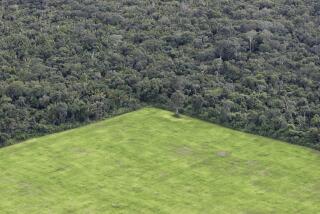South American Trading Bloc Plan Advances
- Share via
ASUNCION, Paraguay — The presidents of Brazil, Argentina, Paraguay and Uruguay signed a blueprint Tuesday to build a gigantic common market--stretching from the Equator to Antarctica--to compete with other world trading blocs.
The Southern Common Market treaty, known as Mercosur, would dismantle trade barriers and encourage cross-border investment and joint projects during the next four years. It aims to integrate neighboring nations that have been stunted by protectionism, rivalry and political instability.
“The American dream is becoming reality. The year 1995 will find us united and not dominated,” Argentina President Carlos Saul Menem said.
Mercosur’s architects hope that with cooperation instead of competition the South American nations can channel their immense natural resources into sustained development and prosperity, overcoming widespread economic troubles.
The four countries have a combined gross national product of $400 billion and a fast-growing population of 180 million.
But one noteworthy non-member of Mercosur is Chile, which has built the region’s most stable economy through a free-market program of export-led development.
Chile has argued that its own trade tariffs are already lower than those of the highly protected Mercosur partners.
After a visit to Santiago, Chile, last week, Uruguay President Luis Alberto Lacalle said Chilean President Patricio Aylwin was noncommittal on the question of Chile’s eventual membership.
“The presence or the absence of Chile in the long run will be a sign of Mercosur’s efficiency. If Chile chooses to join, it will be proof it is working,” Lacalle said.
Breaking the ground for Mercosur were Argentina and Brazil, which signed a $2-billion bilateral treaty in 1986.
Argentina’s Menem and his Brazilian counterpart, Fernando Collor de Mello, last year decided to expand the agreement and form a free-trade zone, an initiative enthusiastically taken up by Uruguay and Paraguay.
Despite widespread initial cynicism and opposition from businesses resentful of outside competition, trade between Brazil and Argentina has flourished, particularly in food products.
More to Read
Sign up for Essential California
The most important California stories and recommendations in your inbox every morning.
You may occasionally receive promotional content from the Los Angeles Times.










